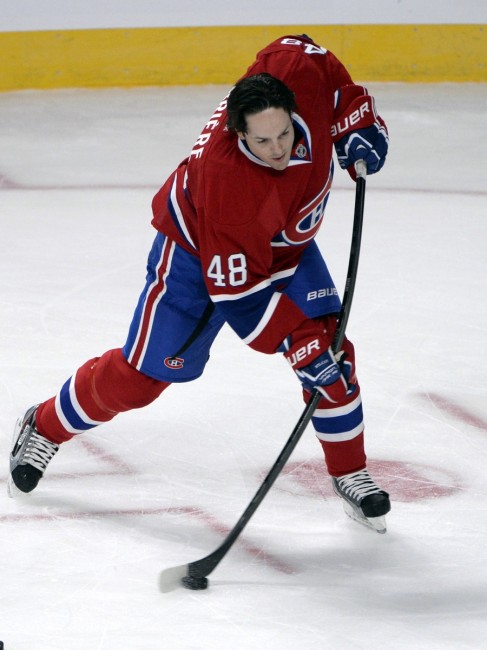
When Daniel Briere signed with the Montreal Canadiens, I’ll admit I was pretty excited. Being a smaller guy myself, I always looked up to Briere growing up as he’s proved that you don’t need to be over six feet tall to be an NHL superstar.
My opinion wasn’t a popular one though. When Briere signed a two year contract for $8 million, many fans felt as if GM Marc Bergevin was only signing Briere as a consolation for missing out on another francophone free agent, Vincent Lecavalier. Although Briere’s had a bit of a bumpy ride during his first year with the Canadiens, I believe that bringing him was a good move on Bergevin’s part.
What’s Causing Daniel Briere’s Inconsistency
Coming off of the worst season in his career, Daniel Briere had something to prove coming out of the gate for the 2013-14 regular season. Unfortunately for Briere’s sake, things didn’t go according to plan. He put up 3 points in his first 8 games with the Habs, which isn’t bad, but then he went on to miss a month of action with a concussion.
Since then, it’s been a bit of a roller coaster ride for him. He’s had stretches where he’s looked outstanding (he had 4 points in 5 games upon returning from his concussion, and also had 4 points in the 2 games following the Olympic break), and he’s had others where he’s looked atrocious (he had 1 point throughout the entire month of December).
So why exactly has Briere been so streaky this season? There are a couple of reasons for this:
1. Lack of Ice Time
At 36 years old, Daniel Briere is no longer the elite point producer he was earlier in his career. However, he’s still shown flashes of the unbelievable scoring touch he had in his younger days when given a chance to take a regular shift this season. The problem for Briere is that he hasn’t been given proper ice time. Averaging 12:46 of ice per game, Briere’s minutes are the lowest they’ve been since the 2000-01 season when he was playing in Phoenix. His numbers have dropped nearly three and a half minutes since last season, for no obvious reason other than the fact that he’s older. Other than his early season concussion that I mentioned earlier, he hasn’t been injured this year, so it’s hard to understand why head coach Michel Therrien hasn’t been playing Briere more. When you consider that a player of similar size and talent, Brian Gionta, is averaging 17:51 a night, over 5 minutes more than Briere, it’s certainly puzzling.
2. Line Juggling

Throughout this season, Briere has never really had a chance to establish himself with a set line combination. He has played all over the place, at times playing on the first line, alongside Max Pacioretty and David Desharnais, as well as the fourth line with Michael Bournival and Travis Moen. He’s also played a centre at times, as well as the wing, without finding a permanent forward position. Previously in his career, Briere has found his best success when playing centre with one line for the majority of the season. Most recently this was seen in the 2009-10 and 2010-11 seasons while Briere played in Philadelphia. Briere played nearly every minute of those two seasons playing centre in between Ville Leino and Scott Hartnell, where he was outstanding scoring 160 points in 186 games (if you include the playoffs). If Briere could just find a permanent spot at centre in the Canadiens’ lineup alongside two wingers whom he could build chemistry with long-term, his numbers would surely go up.
Where He’ll Turn it Around: The Playoffs
When you type in “Daniel Briere Clutch” on Google, over 476,000 results pop up and for good reason. If you had to ask around the league as to who the most clutch playoff performer has been over the past decade, Briere would almost always be in the conversation. A look back at Briere’s career playoff stats supports this notion, as he has posted 109 points in 108 career playoff games. This puts him at just over a point per game during the playoffs, up from his career regular season totals of 0.75 points per game.
I think the biggest reason as to why Marc Bergevin signed Daniel Briere last summer was for this reason. The Canadiens have a relatively young core offensively with limited playoff experience beyond Brian Gionta, Travis Moen and Tomas Plekanec. This would explain why Briere’s minutes have been so limited during the regular season, as Michel Therrien would like the veteran to be fresh for the start of the playoffs.
Is there any guarantee that Briere will once again put up huge numbers in the post season? No, but I can’t see why he can’t improve on what he’s done so far in the regular season, especially if he’s given an increase in ice time. I think it would be foolish to expect him to start scoring at a point per game pace again, but I don’t think it’s out of the question for his 0.39 points per game to rise significantly. He is healthy, and has had a ton of rest this year so he’ll be prepared to contribute with some much needed scoring depth for a (hopefully long) playoff run in Montreal. He has also been playing alongside Brian Gionta, and Lars Eller recently which is a major upgrade over playing on the Canadiens’ fourth line. With Thomas Vanek now on the team, Briere likely realizes that this could be the best team he plays on for the rest of his career, and that he’ll have to give it his all in what could be his last potential chance at winning a Stanley Cup.
The Best Part of His Contract: The Term

If you disagree with me on the Briere signing so far, I can see your point. Even with the limited ice time, 25 points in 64 games is underwhelming for a player with a cap hit of $4 million per season. The beauty of the Briere situation though, is that even if he is a total flop in the playoffs and doesn’t do much next season, the Canadiens won’t need to worry about him for long. That’s because at the end of next season, he is once again an unrestricted free agent, and they can let him go without any reprecussions.
Could you imagine if the Canadiens had signed Vinny Lecavalier instead? Unlike Briere, Lecavalier’s speed has decreased significantly, and his numbers have declined, with 33 points in 62 games. The biggest difference with Lecavalier is that his contract (with a cap hit of $4.5 million) lasts until the end of the 2017-18 season. If he turns out to be a bust (and that’s how things are looking so far), the Flyers will have to deal with 4 more years of essentially dead weight on their salary cap. That contract would’ve been a nightmare for the Canadiens to deal with, so Habs fans should be happy that Montreal landed a guy like Briere instead of Vinny.
In hindsight, the risk of signing Danny Briere for two seasons was worth it. There aren’t really any wingers in Montreal’s minor league system that are ready to step up and play for the Canadiens right now, so having Briere in the mix should help players like Sven Andrighetto, and Martin Reway get some extra seasoning before making the potential jump to the big club for the 2015-16 season. The fact that Briere can provide some secondary scoring for two potential playoff runs is also a major bonus, as goals aren’t easy to come by come playoff time. The signing of Danny Briere may look like a questionable move right now, but at the end of the day I think he’ll prove to everyone that it was the right one.
What’s your take on the Daniel Briere signing? Will he be able to turn it around for the playoffs? Let me know in the comments below or hit me up on Twitter: @jordanparhar. If you have any questions or have a topic you’d like me to touch upon in a future article, email me: truculenttalk@yahoo.ca